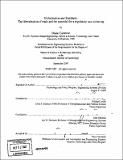Globalization and standards : the liberalization of trade and the potential for a regulatory race to the top
Author(s)
Cameron, Diane (Melissa Jessica Diane)
DownloadFull printable version (10.08Mb)
Alternative title
Liberalization of trade and the potential for a regulatory race to the top
Other Contributors
Massachusetts Institute of Technology. Technology and Policy Program.
Advisor
Richard Locke and John Sterman.
Terms of use
Metadata
Show full item recordAbstract
Globalization is changing the way in which the world is organized. The world trade regime is increasingly the dominant mode of organizing international relations. Within this context of globalization and liberalization of trade, empirical examples of a race to the bottom co-exist with examples of a race to the top and examples of stable heterogeneity of international standards. The puzzle, then, is to determine the structural conditions, sources of power, and policy instruments that determine whether international standards will diverge or converge, upward or downward. This research seeks to reveal the potential for (and limitations of) a race to the top in international standards. System dynamics modeling and theories of globalization and regulatory competition are applied to three case studies to explore the causes of a race to the top: the Montreal Protocol on Ozone Depleting Substances, dolphin-safe tuna, and fair trade coffee. Many of the concerns of a race to the bottom pertain to process and production methods (PPMs) in global supply chains. One of the themes in this research is the distinction between standards based on the characteristics of a product and standards based on the process and production methods (PPMs) used to produce the product. Whereas product standards can be monitored and enforced at the point of market access, PPM standards must be monitored and enforced at the site of production, which can be problematic in global supply chains. This research seeks to elucidate the sources of power and policy levers available to promote higher PPM standards within the context of globalization and the liberalization of trade. (cont.) A set of theories from international law and political economy is selected to create a theoretical framework for analyzing the effects of globalization on international standards. In particular, theories of corporate power, corporate social responsibility, norm change and consumer power elucidate the potential and limitations of voluntary standards. Theories of regulatory capture and competition inform the question of how voluntary standards translate into public policy. The goal is to understand how social and environmental objectives can be promoted within the context of liberalized trade.
Description
Thesis (S.M.)--Massachusetts Institute of Technology, Engineering Systems Division, Technology and Policy Program, 2007. Includes bibliographical references (p. 171-179).
Date issued
2007Department
Massachusetts Institute of Technology. Engineering Systems Division; Technology and Policy ProgramPublisher
Massachusetts Institute of Technology
Keywords
Technology and Policy Program.